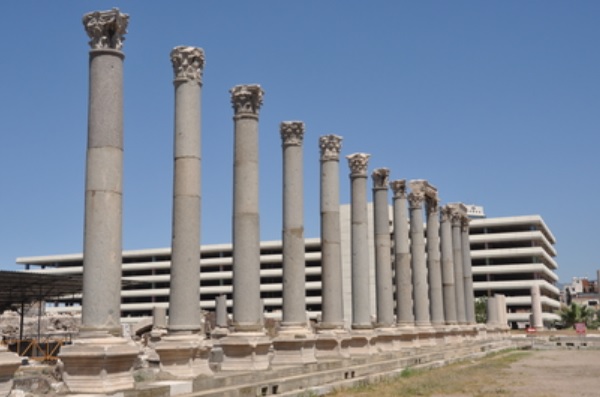“Go therefore and make disciples of all the nations…teaching them to observe all that I commanded you; and lo, I am with you always, even to the end of the age” (Matthew 28:19-20, NASB).
——————–
Contents:
1) PRINCIPLES OF PRAISE: Dependence in Worship (Matthew Bassford)
2) Sword Tips #4 (Joe R. Price)
——————–

-1-
PRINCIPLES OF PRAISE: Dependence in Worship
Matthew Bassford
Synopsis: Recognizing our dependency upon God is fundamental to maintaining a proper view of our lives and a healthy relationship with Him. Expression of this dependence in song helps to instill this concept within our hearts and minds.
——————–
Introduction
One of the greatest of human delusions is the conviction that we can rely on ourselves. Inside every one of us, there lurks a budding Nebuchadnezzar. Along with the Babylonian king in Daniel 4:30, we too want to exclaim about how our accomplishments show how wonderful we are. We want to believe that our strength and wisdom are such that we can emerge from all of life’s trials unscathed.
In reality, rather than being utterly independent from God, we are completely dependent on Him. This is true not only of the faithful Christian but also of the hardened sinner and the contemptuous rebel. As Jesus reveals in Matthew 5:45, the sun shines and the rain falls upon such people only because of the Father’s impartial mercy. All of us are indebted to God for every good thing we enjoy.
Additionally, our ability to overcome is not what we think it is. Paul was a man of tremendous willpower and intellectual gifts, yet he acknowledges in 2 Corinthians 1:8 that he faced trials that were more than he could bear. In time, every human being will reach the same point. In this fallen world that contains such shocking injustice, suffering, and tragedy, all of us will be burdened beyond our strength sooner or later. Even this is to say nothing of the problem of sin, a problem utterly beyond our ability to solve for ourselves.
Learning Dependence
In short, our dependence on God is a lesson that we must learn, learn, and relearn, for so long as we live. According to Deuteronomy 8:3, God fed the children of Israel with manna in the wilderness for forty long years to drive home the point that they were sustained not by their own efforts, but by Him. We can refuse to accept this vital truth, but such resistance can amount to nothing more than kicking against the goads.
There are many ways in which God teaches us about our dependence on Him, but one of the most valuable is through song. Our Creator designed us so that we are uniquely susceptible to the emotional truths that we sing. In our worship, we are not supposed to summon that emotional power for its own sake. We are supposed to use it to drive the word of God deeply into our hearts.
The importance of expressing our dependence on God is amply revealed in the only inspired hymnal we have, the book of Psalms. Certainly, the specifics of our worship have changed since David’s day, but the essential relationship between man and God has not. Three thousand years ago, God’s people needed Him neither more nor less than do we.
From beginning to end, the Psalms exalt this timeless truth. Few indeed are the psalms that do not address human dependence on God in some way. When the Israelites sang those words wholeheartedly, they were confessing how much they needed the Lord. When we similarly acknowledge our reliance on God in the sentiments we express in singing, it transforms our worldview too.
Dependence in the Psalms
Our worship should first expose our dependence on God for the physical blessings we enjoy. The Psalms express this valuable perspective in, among other places, Psalm 127:1-2. Here, Solomon makes no bones about the insufficiency of human effort. Think you can build a house without God? Think you can guard against danger without Him? Think you can provide for yourself and your family by yourself, even working 24/7? Think again! As Jesus points out in Matthew 6:27, none of us can add so much as a cubit to the span of our lives. Despite our pretensions, we are every bit as dependent on God’s providence as the ravens and the lilies.
So too, only God is able to guard us from the evil that others work. Psalm 142 relates a sad story. David finds himself beset by enemies who are laying traps for him, but when he looks to his right hand, where his protector should be (as in the English idiom “right-hand man”), there’s no one there. He has been abandoned. He certainly can’t overcome his enemies by himself, so in his extremity, he has no other option than to call out to the Lord for rescue. When God delivers David, he promises to praise Him to other righteous people too, so that they will know where to turn when they need help.
This is particularly relevant in a time when evil seems to have the upper hand. Most of us would agree that we live in such a time, but in Psalm 11, David says the same. If the righteous try to flee like a bird (our hymn “Flee as a Bird” originates from Psalm 11:1), the wicked will just shoot them out of the sky like an archer! Nor can the godly stay where they are because the very foundations of human society are being destroyed.
When this is the situation, God is the only hope of those who love Him. He is not asleep. He was fully aware of everything that was going on during Saul’s reign, and He continues to be fully aware today. When the time is right, He will judge, and we can count on Him to punish the wicked and exalt the righteous. When we remind ourselves of this in song, it will give us the boldness to endure until the end as well.
More personally, our worship should also instruct us that we must depend on God for forgiveness. David makes this point plainly in Psalm 32:3-6, and he speaks with the voice of experience. He tried to hide his sin. It ate him up. However, when he brought his sin to the Lord, he found forgiveness instantly. His conclusion for all the faithful is that they should likewise turn to God.
If this was true for David, who lived under the Law of Moses and could only have his sins rolled back for a time, how much more true is it for us! In Christ, we can find forgiveness that is truly incomprehensible in its extent and depth. Of ourselves, we cannot atone for a single sin, but in Him, we can find forgiveness for all of them, and the number of sins in “all” is irrelevant. If ever there was reason to rely on God (and to sing about that reliance), our need for forgiveness is it!
Finally, the Psalms show us that we must rely on God to inherit eternal life. As is often the case in the Old Testament, this truth is not revealed plainly, but it is there. Consider the discussion of Psalm 102:23-28. There, the psalmist laments that God appears to be about to cut his life short.
However, God has the power to sustain him, as shown by His establishment of the heavens and earth. Even though the psalmist anticipates a time when the physical creation will wear out and pass away, he remains confident in His ability to preserve His people. This, too, is our hope. We will never overcome death on our own, but through God, all things are possible, and that’s a hope we should celebrate in song until our dying day.
Conclusion
One of the most unwelcome truths about our lives is that their course is fundamentally out of our control. The most welcome truth is that we don’t have to control them because we can depend on God instead. Everything that His people need He will unfailingly provide. When we concede our dependence in worship, we lose any lingering illusions about our self-sufficiency. However, we gain something that is very much greater: our assurance and rest in Him.
— Via Truth Magazine, Volume 65, No. 5, May 2021
https://truthmagazine.com/kindle/2021/2021-05-may/05_Praise.htm
——————–

-2-
Sword Tips #4
Joe R. Price
“Josiah was eight years old when he became king, and he reigned thirty-one years in Jerusalem. And he did what was right in the sight of the LORD, and walked in the ways of his father David; he did not turn aside to the right hand or to the left. For in the eighth year of his reign, while he was still young, he began to seek the God of his father David; and in the twelfth year he began to purge Judah and Jerusalem of the high places, the wooden images, the carved images, and the molded images” (2 Chronicles 34:1-3).
Young people can do great things for the Lord! As a young person, seize your opportunities to obey the Lord and live by faith (1 Tim. 4:12). As a parent, advance your child’s faith by teaching God’s word, by godly discipline and by setting worthy examples for them to follow (Eph. 6:3-4).
Why not encourage a young person today? They can live for Christ and resist the evils of this world. Like Josiah, while they are young they can begin to seek the Lord God and be forces for good
——————–
The Steps That Lead to Eternal Salvation
1) Hear the gospel — for that is how faith comes (Rom. 10:17; John 20:30-31).
2) Believe in the deity of Jesus Christ, the Son of God (John 8:24; John 3:18).
3) Repent of sins. For every accountable person has sinned (Romans 3:23; Romans 3:10), which causes one to be spiritually dead (Ephesians 2:1) and separated from God (Isaiah 59:1-2; Romans 6:23). Therefore, repentance of sin is necessary (Luke 13:5; Acts 17:30). For whether the sin seems great or small, there will still be the same penalty for either (Matt. 12:36-37; 2 Cor. 5:10) — and even for a lie (Rev. 21:8).
4) Confess faith in Christ (Rom. 10:9-10; Acts 8:36-38).
5) Be baptized in water for the remission of sins (Mark 16:16; Acts 2:38; 22:16; 1 Pet. 3:21). This is the final step that puts one into Christ (Gal. 3:26-27). For from that baptism, one is then raised as a new creature (2 Cor. 5:17), having all sins forgiven and beginning a new life as a Christian (Rom. 6:3-4). For the one being baptized does so “through faith in the working of God” (Col. 2:12). In other words, believing that God will keep His word and forgive after one submits to these necessary steps. And now as a Christian, we then need to…
6) Continue in the faith by living for the Lord; for, if not, salvation can be lost (Matt. 24:13; Heb. 10:36-39; Rev. 2:10; 2 Pet. 2:20-22).
——————–
Tebeau Street
CHURCH OF CHRIST
1402 Tebeau Street, Waycross, GA 31501
Sunday: 9 a.m. Bible Classesand 10 a.m. Worship Service. We also have a Congregational Song Service at 5 p.m. for every first Sunday of the month.
Wednesday: 7 p.m. for Bible Classes
evangelist/editor: Tom Edwards (912) 281-9917
Tom@ThomasTEdwards.com
https://thomastedwards.com/go/all.htm (This is a link to the older version of the Gospel Observer website, but with bulletins going back to March 4, 1990.)















